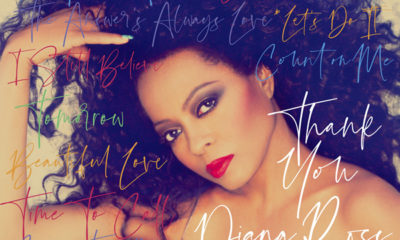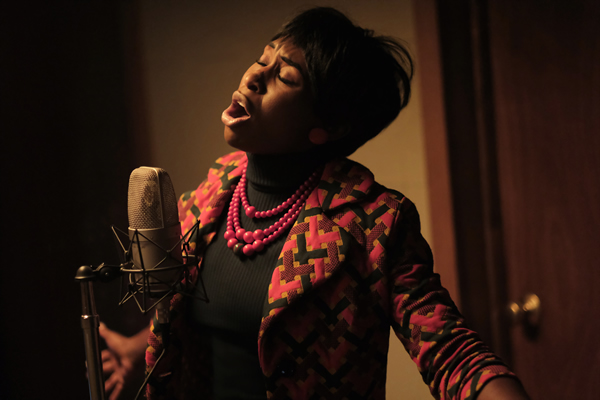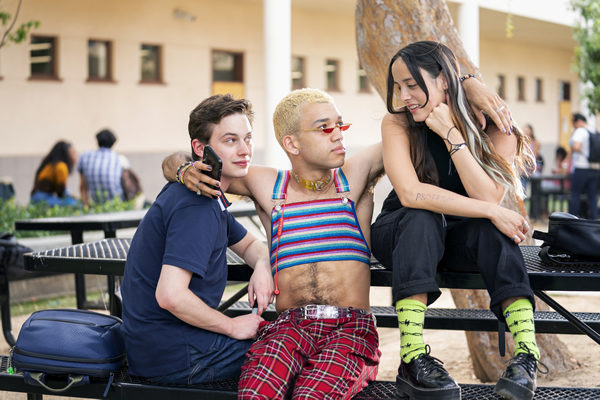Arts & Entertainment
Franklin’s fumble
New album finds ‘woman falling’ with bad songs, dated production
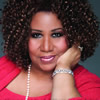
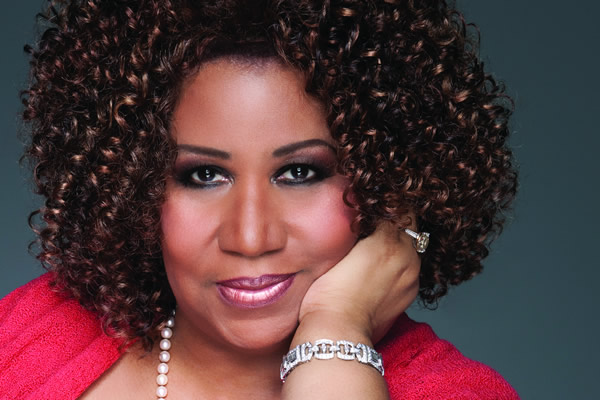
So why not re-shoot your album cover after you lost 85 pounds? Alas the cover of Aretha Franklin's new album is but one of many mysteries surrounding the soul legend. (Photo courtesy of Wal-Mart)
It’s painful when a long-awaited album from a much-loved artist finally appears and is a disaster.
The pain is especially acute on Aretha Franklin’s new album, the Wal-Mart exclusive “A Woman Falling Out of Love.” Rumors swirled wildly last fall that she had pancreatic cancer — Rolling Stone even went to press with the news citing anonymous Franklin family members. So it’s a delight and huge relief to see a much trimmer Aretha — she lost about 85 pounds — back on the media circuit, looking healthier than she has in years and rescheduling concerts she postponed last year during her mystery illness (she plays Wolf Trap June 21).
What a sweet coda to the story if “Woman Falling” had been a solid, career-punctuating comeback on a par with her last good album, 1998’s “A Rose is Still a Rose.” Sadly, it’s her worst album in ages joining schlock like “Almighty Fire,” “You,” “Sweet Passion” and “Get it Right” as some of the least compelling junk in her vast discography.
Aside from the fact that she’s healthy and, based on last week’s TV promo appearances, in reasonably good voice, the good news is that the album is out at all. She was predicting an imminent release as far back as 2006 when she first mentioned the title to Billboard. It was so unfathomably delayed, it became almost a joke, sort of R&B’s answer to “Chinese Democracy,” the decade-in-the-making Guns n’ Roses album that finally saw release in 2008. Despite being active on the touring circuit, Franklin’s studio output ground nearly to a halt in the last 10 years. There was an uneven Christmas album in 2008. Her last “real” album was 2003’s “So Damn Happy.” It felt hit-and-miss at the time; it plays like a masterpiece, though, compared to “Woman Falling.”
Franklin has boasted in interviews this new project finally gives her creative control. She sees this as a major plus — sadly, she’s probably the only one. Her career, despite all the critical acclaim, has always been spotty. For every “Think,” “Freeway of Love” or “Chain of Fools,” there’ve been dozens of mediocre album tracks that fail to resonate. Because her early years at Atlantic were so smoldering and her voice has lasted, Franklin always managed a staggering level of acclaim considering how much junk there is on many of her records.
But left to her own devices, Franklin stumbles badly here churning out an inconsistent and all-over-the-map sonic mess that struggles to muster even one catchy hook or chorus. “This You Should Know” (which she both wrote and produced), “Put it Back Together Again,” “When 2 Become One” and first single “How Long I’ve Been Waiting” sink like quicksand in a soggy stew of momentum-sapping and dated-sounding R&B drivel.
Franklin, thankfully, sounds great. Her voice — while not quite the rafter raising feat of nature it was 30 years ago — still has a luster and sheen that’s delightful to hear. In a way, though, it makes this album doubly tragic — with better material, it’s obvious Franklin possesses the vocal wherewithal to have produced a home run.
The covers are hit and miss, but two of the three are the record’s high points. A sassy, bluesy cover of B.B. King’s “Sweet Sixteen” promises early hope but proves an isolated and fleeting moment. A duet with an oddly uncredited Ronald Isley on “The Way We Were” is sweeping and feels positively glorious compared to everything else. “A Summer Place,” the theme from the 1959 film of the same title, doesn’t fare nearly as well. An oddball outro dialogue with an uncredited male guest is embarrassing, cheesy and weird.
The insipd “New Day” sounds like a promising change of pace initially with its deep bassline but soon dissolves into trite lyrics (“you can make it if you try!”). “Faithful,” a duet with gospel’s Karen Clark-Sheard is so ludicrously oversung it makes Christina Aguilera sound reserved.
And despite a Billy Preston-caliber organ accompaniment courtesy of Darrell Houston, “His Eye is On the Sparrow” shows merely that Franklin’s son Eddie, singing lead here, inherited his mother’s range but not her interpretive finesse. She accompanies him on piano. It gives the album warmth, but since Aretha’s never recorded this standard herself, I’d have much rather heard her sing it.
The album closes with a bombastic rendition of “My Country Tis of Thee,” which Franklin sang at Obama’s inauguration. She battled the cold that day — here she battles an overwrought orchestration (her own arrangement) that never met a musical cliché (rumbling timpani!, gospel choir on caffeine!) that it didn’t try to work in.
Franklin said she cut tracks with Faith Hill, Shirley Caesar and several producers for this album but they’re all MIA. It’s impossible to know how much was recorded over the last five years for this album but considering what made the final cut, one shudders to imagine the outtakes. From the amateur photography and packaging to the dubious selections and bland production, this is a near-total disaster.
Books
‘Pronoun Trouble’ reminds us that punctuation matters
‘They’ has been a shape-shifter for more than 700 years

‘Pronoun Trouble’
By John McWhorter
c.2025, Avery
$28/240 pages
Punctuation matters.
It’s tempting to skip a period at the end of a sentence Tempting to overuse exclamation points!!! very tempting to MeSs with capital letters. Dont use apostrophes. Ask a question and ignore the proper punctuation commas or question marks because seriously who cares. So guess what? Someone does, punctuation really matters, and as you’ll see in “Pronoun Trouble” by John McWhorter, so do other parts of our language.

Conversation is an odd thing. It’s spontaneous, it ebbs and flows, and it’s often inferred. Take, for instance, if you talk about him. Chances are, everyone in the conversation knows who him is. Or he. That guy there.
That’s the handy part about pronouns. Says McWhorter, pronouns “function as shorthand” for whomever we’re discussing or referring to. They’re “part of our hardwiring,” they’re found in all languages, and they’ve been around for centuries.
And, yes, pronouns are fluid.
For example, there’s the first-person pronoun, I as in me and there we go again. The singular I solely affects what comes afterward. You say “he-she IS,” and “they-you ARE” but I am. From “Black English,” I has also morphed into the perfectly acceptable Ima, shorthand for “I am going to.” Mind blown.
If you love Shakespeare, you may’ve noticed that he uses both thou and you in his plays. The former was once left to commoners and lower classes, while the latter was for people of high status or less formal situations. From you, we get y’all, yeet, ya, you-uns, and yinz. We also get “you guys,” which may have nothing to do with guys.
We and us are warmer in tone because of the inclusion implied. She is often casually used to imply cars, boats, and – warmly or not – gay men, in certain settings. It “lacks personhood,” and to use it in reference to a human is “barbarity.”
And yes, though it can sometimes be confusing to modern speakers, the singular word “they” has been a “shape-shifter” for more than 700 years.
Your high school English teacher would be proud of you, if you pick up “Pronoun Trouble.” Sadly, though, you might need her again to make sense of big parts of this book: What you’ll find here is a delightful romp through language, but it’s also very erudite.
Author John McWhorter invites readers along to conjugate verbs, and doing so will take you back to ancient literature, on a fascinating journey that’s perfect for word nerds and anyone who loves language. You’ll likely find a bit of controversy here or there on various entries, but you’ll also find humor and pop culture, an explanation for why zie never took off, and assurance that the whole flap over strictly-gendered pronouns is nothing but overblown protestation. Readers who have opinions will like that.
Still, if you just want the pronoun you want, a little between-the-lines looking is necessary here, so beware. “Pronoun Trouble” is perfect for linguists, writers, and those who love to play with words but for most readers, it’s a different kind of book, period.
The Blade may receive commissions from qualifying purchases made via this post.

Friday, April 18
“Center Aging Friday Tea Time” will be at 2 p.m. on Zoom. This is a social hour for older LGBTQ+ adults. Guests are encouraged to bring a beverage of choice. For more details, email [email protected].
Go Gay DC will host “LGBTQ+ Community Social in the City” at 7 p.m. at Hotel Zena. This event is ideal for making new friends, professional networking, idea-sharing, and community building. This event is free and more details are available on Eventbrite.
Trans and Genderqueer Game Night will be at 6 p.m. at the DC Center for the LGBT Community. This will be a relaxing, laid-back evening of games and fun. All are welcome and there’ll be card and board games on hand. Feel free to bring your own games to share. For more details, visit the DC Center’s website.
Saturday, April 19
Go Gay DC will host “LGBTQ+ Community Brunch” at 11 a.m. at Freddie’s Beach Bar & Restaurant. This fun weekly event brings the DMV area LGBTQ+ community, including Allies, together for delicious food and conversation. Attendance is free and more details are available on Eventbrite.
LGBTQ People of Color Support Group will be at 7 p.m. on Zoom. This peer support group is an outlet for LGBTQ People of Color to come together and talk about anything affecting them in a space that strives to be safe and judgement free. There are all sorts of activities like watching movies, poetry events, storytelling, and just hanging out with others. For more information and events for LGBTQ People of Color, visit thedccenter.org/poc or facebook.com/centerpoc.
“Spark Sapphic Social” will be at 8 p.m. at Spark Social House. This weekly sapphic social is an opportunity to mix and mingle with other sapphics in D.C.’s newest LGBTQ bar. This event is free and more details are available on Eventbrite.
“DC Drag Brunch on Rooftop – Penthouse (Formerly at Lima Twist)” will be at 12 p.m. at Baby Shank Rooftop. Hosted by Miss Capital Pride, this is the ultimate drag brunch experience in Washington, D.C., featuring the fiercest queens around. Prepare to be entertained by glamorous drag queens and celebrated celebrity impersonators, including Taylor Swift, Lady Gaga, Beyoncé, Britney Spears, Nicki Minaj, Ariana Grande, Whitney Houston, Cher and many more. Tickets cost $27 and are available on Eventbrite.
Sunday, April 20
Queer Crayon Club will host “Queer Sketch Social” at 3 p.m. at Sinners and Saints. This is a fun event for LGBTQ+ adults to come together and color. Attendance is free and more details are available on Eventbrite.
Monday, April 21
“Center Aging Monday Coffee & Conversation” will be at 10 a.m. on Zoom. This is a social hour for older LGBTQ+ adults. Guests are encouraged to bring a beverage of choice. For more details, email [email protected].
Tuesday, April 22
Genderqueer DC will be at 7 p.m. on Zoom. This support group is for people who identify outside of the gender binary. Whether you’re bigender, agender, genderfluid, or just know that you’re not 100% cis – this is your group. For more details, visit www.genderqueerdc.org or Facebook.
Coming Out Discussion Group will be at 7 p.m. on Zoom. This is a peer-facilitated discussion group and a safe space to share experiences about coming out and discuss topics as it relates to doing so. For more details, visit the group’s Facebook.
Wednesday, April 23
Job Club will be at 6 p.m. on Zoom. This is a weekly job support program to help job entrants and seekers, including the long-term unemployed, improve self-confidence, motivation, resilience and productivity for effective job searches and networking — allowing participants to move away from being merely “applicants” toward being “candidates.” For more information, email [email protected] or visit thedccenter.org/careers.
Asexual and Aromantic Discussion Group will be at 7 p.m. on Zoom. This is a space where people who are questioning this aspect of their identity or those who identify as asexual and/or aromantic can come together, share stories and experiences, and discuss various topics. For more details, email [email protected].
Thursday, April 24
Virtual Yoga with Sarah M. will be at 7 p.m. on Zoom. This is a free weekly class focusing on yoga, breath work, and meditation. For more details, visit the DC Center for the LGBT Community’s website.
DC Anti-Violence Project Open Meeting will be at 7 p.m. on Zoom. This meeting is open to anyone interested in learning more and getting involved in lessening violence both within and directed towards the LGBT communities. For more information, visit Facebook or Twitter.
Movies
Heartfelt ‘Wedding Banquet’ remake a romcom worth seeing
Mishaps, crossed wires, conflicts are all part of the fun
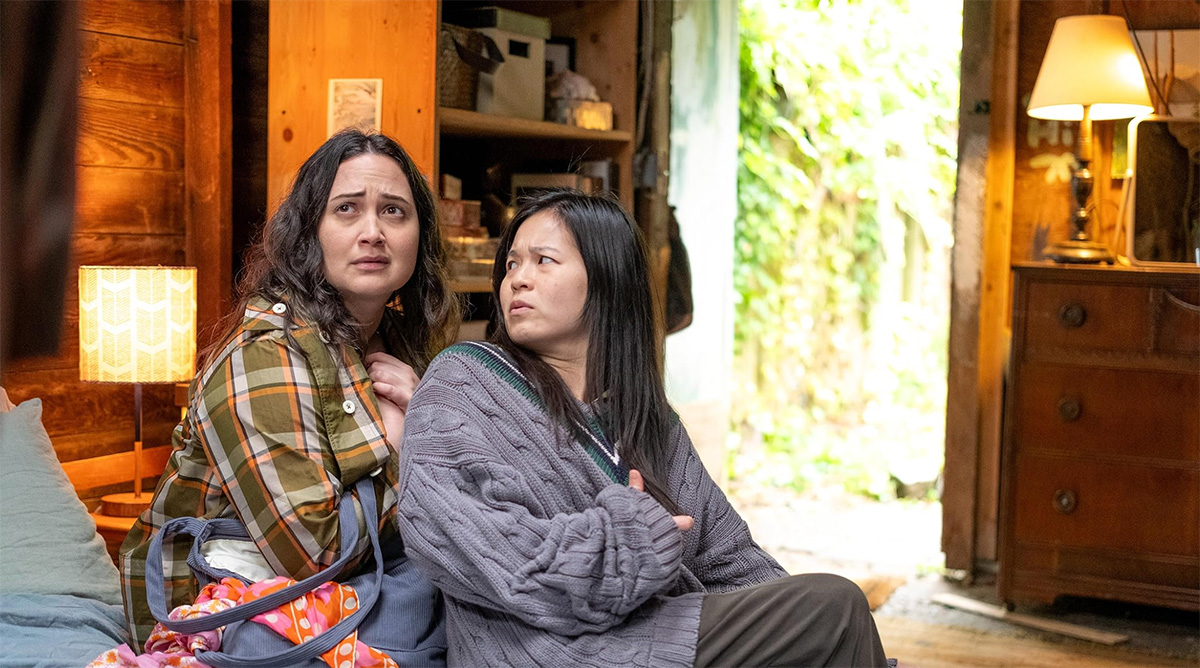
Creating a worthy remake can be a tricky proposition, especially when the movie being remade is a beloved classic – but that doesn’t mean it’s an impossible one.
Consider Andrew Ahn’s new version of 1993’s “The Wedding Banquet,” a film that put future “Brokeback Mountain” director Ang Lee on the proverbial map in America, which opens in theaters this weekend after a debut at Sundance earlier this year. The original, an American/Taiwanese production which became a surprise hit in the U.S., broke ground with its story — a culture-clash comedy of manners about a queer romantic triangle attempting to stage a sham wedding, it was quickly embraced by LGBTQ audiences thrilled to see representation on the big screen and positive representation, at that, in an era when it was even scarcer than it is today. To undertake a remake of such a film is a bold move, to say the least.
Yet gay Korean American writer/director Ahn (“Spa Night,” “Fire Island”) – has built his blossoming career on films about queer relationships among Asian American characters, with as much (or more) emphasis on family, both biological and chosen, as on romantic partnership; It seems natural, perhaps, for him to reinterpret this influential classic through his own lens, and he’s already proven himself as a filmmaker whose strengths line up perfectly with the material.
Even so, Ahn hedges his bets, perhaps, by collaborating on the new screenplay with James Schamus, who also co-wrote the original (along with Lee and Neil Peng), and the result is a movie that – although it recrafts the original romcom for a newer age and reconfigures its central relationships a bit to “up the ante” on its complications – stays relatively faithful to the broad strokes of its plot.
In this iteration, the New York setting is transposed to Seattle, and the plot revolves around not just one queer romance, but two: Chris and Min (Bowen Yang and Han Gi-Chan), a stalled grad student and his South Korean boyfriend, and their lesbian friends-and-landladies Lee and Angela (Lily Gladstone and Kelly Marie Tran), who are struggling to become parents through expensive IVF treatments. Min, an artist whose temporary visa is about to expire, wants to stay with Chris and build a life in America, but his grandmother (Youn Yuh-jung) – currently running the vast family business empire to which he is heir – wants him to come home and claim his place in the organization. A wedding to Chris would secure him the green card he needs to defy his grandmother’s demands, but it would also mean outing himself as gay and potentially being cut off from his inheritance. As a solution, he offers to pay for Lee and Angela’s fertilization procedure in exchange for a “green card wedding” with the latter, ensuring that he can remain in the U.S. while also remaining in the closet to his family.
Of course it’s an idea as bad as it sounds, but despite some reticence, the couples agree to the plan; but when grandmother decides to come to America and meet the bride in person, the four of them must attempt to pull off a masquerade that escalates far beyond their expectations after she insists on putting on a traditional – and elaborate – Korean wedding worthy of her grandson’s exalted status, all while wrestling with the ambivalence and doubts that begin to encroach on their relationships as the scheme begins to fray at the edges.
Those who’ve seen the original already know that things don’t play out exactly as planned – and anyone who hasn’t won’t be surprised when it doesn’t, anyway. We already told you it was a bad idea.
That, of course, is the charm of the romcom, a genre in which mishaps, crossed wires and conflicts are all part of the fun, and in any case it gives Ahn’s film the opportunity to explore – as Lee did with the original – the more serious and relatable challenges of reconciling our queerness with the deeply ingrained traditions of our cultural background; he does so with gentle wit and an equal measure of respect, but he’s not above getting laughs by pointing up the sheer absurdity that sometimes goes along with the process. Neither does he hesitate to delve into the messiness of queer relationships, even (and perhaps especially) with lifelong friends, or the deep insecurities and self-criticisms which get in the way of sorting them out.
To these ends, “Wedding Banquet” relies heavily on its cast, who embrace and clearly relish the chance to flesh out these characters. Yang brings his inevitable “SNL” star power to the table but downplays the wackiness in favor of a more nuanced tone, and Gi-Chan shines as his pragmatically idealistic partner; Gladstone’s intelligence and authenticity is a grounding force, while Tran counterpoints her with an eminently likable turn as her spunky-but-anxious misfit of a girlfriend – and the resonance they each bring to the prospect of motherhood highlights the longing for family and legacy that so many queer couples carry as they build their lives together.
It’s not all about the couples, though. Veteran Chinese American actress Joan Chen (“Tai Pan,” “Twin Peaks”) is a scene stealer as Angela’s hyper-supportive mom, whose participation in her daughter’s “lavender wedding” requires her to go against her deepest instincts as a proud ally, and Bobo Le provides a further connection to the theme of family with a charming performance as Yang’s tomboy-ish little sister. The anchoring performance, however, comes from acclaimed Korean star Yuh-jong, whose shrewd, savvy, and staunch portrayal of Gi-Chan’s power player grandma adds a much-needed dose of level-headed wisdom into the midst of the whirlwind.
In the end, Ahn’s update of Lee’s classic comedy scores big points for honoring the original’s message of acceptance and embracing the notion of reimagining our ideas of traditional family structures to meet the needs of an ever-changing world; it also succeeds in maintaining a heartfelt sense of empathy for each of its characters, all of whom appeal to us precisely because of their imperfections and their hangups. None of them are perfect, but all of them are perfectly human, which goes a long way toward making Ahn’s remake feel like more than just the slickly-made feel-good romcom it resembles.
And yet, given the screwball potential and the endless possibilities for farcical developments in the convoluted deception attempted by its sets of lovers, Ahn’s “Wedding Banquet” could have been funnier. Leaning into an idealized and sentimental perspective as it gracefully brings its characters’ lives into place, it occasionally feels a bit “precious,” too “Hollywood” to be believed.
Again, however, this is part of the charm of the romcom: if generations of straight audiences have gotten the chance to buy into idealized big screen fantasies about life and love, then why shouldn’t we enjoy the same privilege?
With that in mind, “The Wedding Banquet” makes for a perfect opportunity to entertain and validate ourselves – and even if it doesn’t tickle your funny bone, it’s a generous enough feast for your queer soul that it deserves you to see it.
Just make sure you bring somebody special to share your popcorn with.
-

 El Salvador4 days ago
El Salvador4 days agoGay Venezuelan makeup artist remains in El Salvador mega prison
-

 State Department3 days ago
State Department3 days agoHIV/AIDS activists protest at State Department, demand full PEPFAR funding restoration
-

 Maryland5 days ago
Maryland5 days agoMd. schools plan to comply with federal DEI demands
-

 Brazil3 days ago
Brazil3 days agoUS lists transgender Brazilian congresswoman’s gender as ‘male’ on visa

